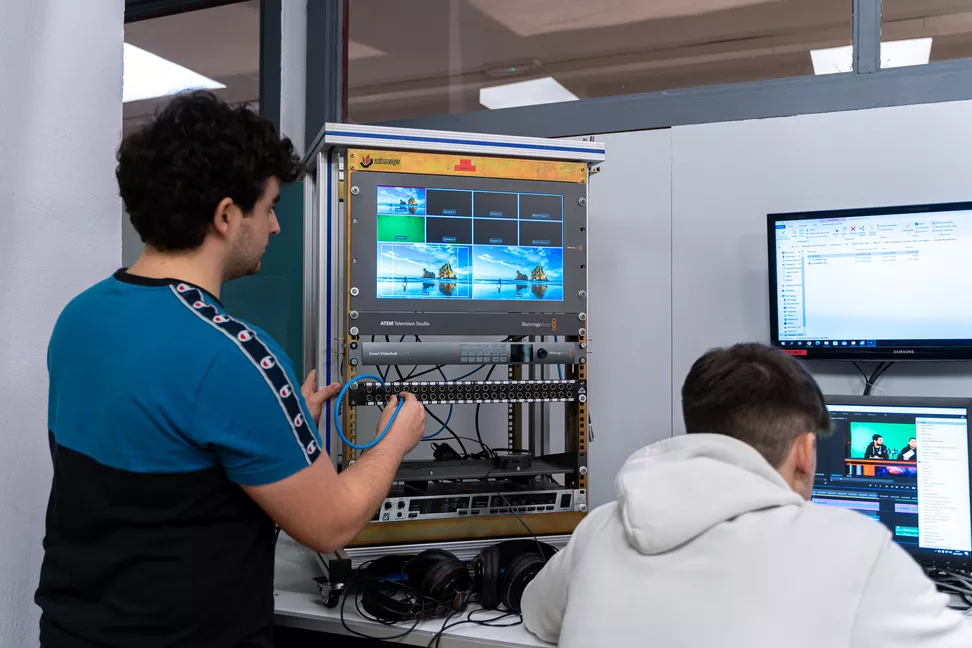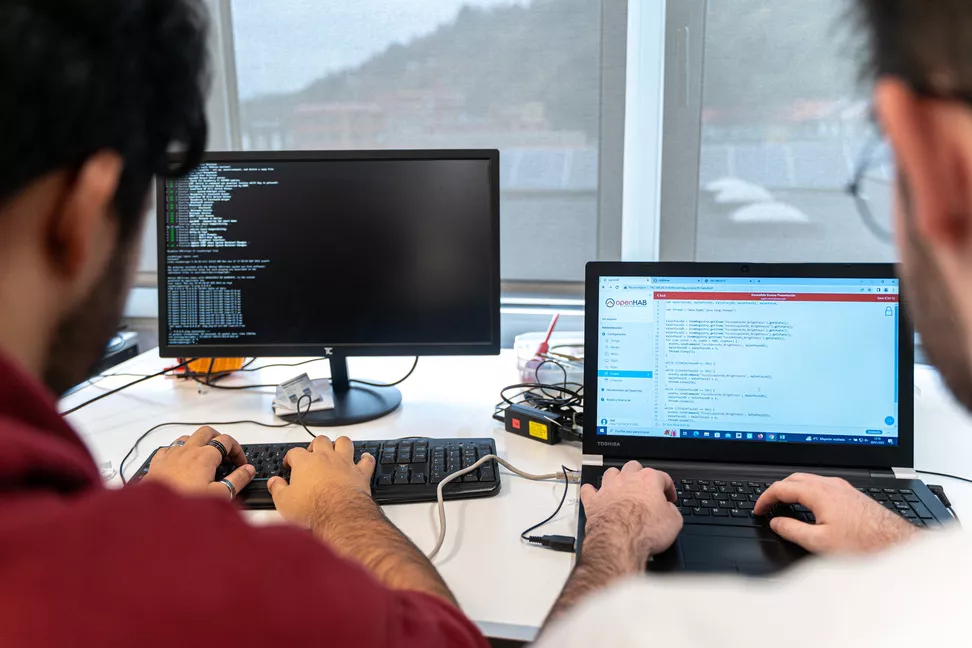The holder of this diploma will have acquired the General Competence with regard to:
- Developing projects;
- Managing and supervising the assembly and the maintenance of common telecommunication infrastructures and telecommunication systems and equipment such as broadband networks and fixed and mobile radio, electronic systems, audiovisual production and transmission, based on technical documentation, regulations and procedures;
- Ensuring the performance, the quality, the safety and the environmental conservation.
| Professional Module | Hours-total | Year |
| Configuration of Telecommunication System Infrastructures | 132 | 1st |
|
Elements of Telecommunications Systems
|
132 | 1st |
|
Computer Systems and Local Networks
|
231 | 1st |
|
Techniques and Processes in Telecommunication Infrastructures
|
198 | 1st |
|
Management of Projects of Telecommunication Installations
|
66 | 1st |
|
Personal itinerary for employability I
|
120 | 1st |
|
Digitalization applied to productive sectors
|
60 | 1st |
|
Sustainability applied to productive sectors
|
30 | 1st |
|
Audiovisual Production Systems
|
120 | 2nd |
|
Systems of Fixed and Mobile Telephony
|
132 | 2nd |
|
Electronic networks
|
140 | 2nd |
| Radiocommunication Systems | 120 | 2nd |
|
Integrated Systems and Digital Home
|
120 | 2nd |
|
Intermodular project
|
50 | 2nd |
|
Professional English
|
63 | 2nd |
|
Personal itinerary for employability II
|
63 | 2nd |
|
Optional modules
|
84 | 2nd |
Access to the High-level courses or modules requires compliance with at least one of the following conditions:
- To be in possession of the Post-compulsory High School Diploma or a certificate proving that all subjects of the Post-compulsory High School have been passed.
- To have passed the third year of the Unified and Polyvalent Baccalaureate (BUP): Accreditation through academic certification of having passed all subjects leading to the Post-compulsory High School regulated by Law 14/1970, of 4 August, on General Education and Financing of Educational Reform, after completing the third year of aforesaid studies (Order EFP/1210/2021 of November 2, which establishes the equivalence, for the purposes of access to vocational training courses, of certain studies and qualifications prior to the current education system).
- To have passed the second year of the Experimental Post-compulsory High School (Bachillerato experimental).
- To be in possession of a Technician certificate (Intermediate-level Vocational Training).
- To be in possession of a Higher Technician or Specialist Technician certificate, or equivalent for academic purposes
- To have passed the University Orientation Course (COU).
- To be in possession of any university degree or equivalent.
- To have passed the entrance exam for higher-level training courses (it will be required to be at least 19 years old in the year the test is taken or 18 for those who have a Technician’s degree).
- To have passed the university entrance exam for those over 25 years old.
Either you work as a/an:
- Assistant designer in telecommunication installations for homes and buildings.
- Specialist in installation, integration and maintenance of telecommunications equipment and systems.
- Site manager in telecommunication installations.
- Technician in verification and control of telecommunication equipment and installations.
- Technician in supervision, installation, testing and control of radio and television equipment systems and audiovisual production systems in production studios.
- Technician in supervision, installation, maintenance, testing and control of broadcasting systems equipment.
- Technician in supervision, installation, maintenance, testing and control of electronic security systems equipment and CCTV.
- Technician in supervision, installation, maintenance, verification and monitoring of local networks and electronic systems.
- Technician in supervision, installation, maintenance, monitoring and control in radio-relay systems.
- Specialist in integration, installation and maintenance of computer equipment and systems.
Or you continue studying:
- Professional specialization courses.
- Another Higher-level Vocational Training course with the possibility of establishing validations of professional modules in accordance with current regulations.
- Preparation for the Bachillerato or A level Assessment Tests (only the optional subjects from the core block).
- University studies, with the possibility of establishing validations in accordance with current regulations.
This professional will be able to:
- Develop telecommunications installation or system projects, obtaining data and characteristics for the preparation of reports and specifications.
- Calculate the parameters of equipment, elements and installations, complying with current regulations and client requirements.
- Configure telecommunications installations and systems according to specifications and regulatory requirements.
- Plan the installing of telecommunications installations and systems according to technical documentation and construction conditions.
- Launch the installation of telecommunications installations based on the established schedule and the construction project plan.
- Supervise and/or execute the installation processes of telecommunications installations and systems, verifying their suitability for construction conditions and monitoring their progress to meet company objectives.
- Plan maintenance based on regulations, installation conditions and manufacturer recommendations.
- Supervise and/or execute the maintenance processes of the installations, controlling the timing and quality of the results.
- Carry out the commissioning of telecommunications facilities and equipment, supervising compliance with requirements and ensuring quality and safety conditions.
These teachings include the knowledge required to carry out basic level activities for the prevention of occupational risks.











